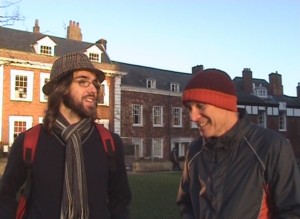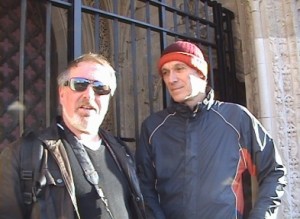December 9, 2011
EcoIsland is "A Paradise in the Making"?
The New Statesman has just published an article about the Isle of Wight entitled "A Paradise in the Making"! They make this bold claim because David Green's EcoIsland Partnership has recently been launched with a fair amount of fanfare in a large marquee just outside the Houses of Parliament in London.
As Stephen Stead from Toshiba International describes the project:
The Isle of Wight is known for many qualities: its outstanding beauty, 13 award winning beaches and 500 miles of footpaths through unspoilt scenery, making it a favourite holiday destination for many. What it is not so widely recognised for – for the time being at least – is its pioneering approach to sustainability. It is, or at least it will be, with the help of several partners, a smart community – England's first EcoIsland.
At a time when many commentators struggle to define what a smart grid is, the prospect of describing a smart community is an even more daunting task.
Undaunted Stephen goes on to say that:
A smart community… can be considered as a community that exploits technology to provide cost and efficiency benefits. In the main, it is becoming increasingly aligned to one specific societal need – that of energy sustainability.
Whilst we wait to see whether Chris Huhne can achieve his stated goal of a global "legally binding agreement under the United Nations" aimed at ensuring energy sustainability at the COP17 meeting in Durban, part of the UK Government's current drive in that direction is a target of 30% of the UK's energy to be supplied from renewable sources by 2020. Unfortunately, as the New Statesman article points out:
Renewables are, by their very nature, intermittent and unpredictable; extensive periods of depressed generation can be followed by excess production. Currently, at times of peak demand, alternatives such as dirty diesel, standby oil-fired power stations, or other equally unattractive options are employed. However, the majority of these are both expensive and bad for the environment.
Coupled with this is the problem faced by the distribution networks. These were not built to cope with either the levels or patterns of generation and demand connected to them. Nor were they built to handle the concept of local generation, such as solar and wind, feeding power back up lines which were only designed to have power flowing down them.
Solving that problem is where EcoIsland can help!
Toshiba and IBM are working with the island and other companies to develop innovative ways in which demand and supply can be managed and controlled in order to maximise potential use of renewable power sources – something it is hoped will reduce emissions and waste, while at the same time cutting the Isle of Wight's fuel bills by up to 50 per cent.
Stephen explains how all this might work by introducing his readers to the concept of:
The Negawatt, which provides hypothetical negative energy consumption by reducing usage at a given point in time. As energy prices rise, as reliance on intermittent generation increases and network constraints become more prevalent, the Negawatt will provide a significant balancing tool and will, somewhat ironically, become a key part of our energy mix.
However all this exciting new technology, along with its innovative new buzzwords, is not enough on its own. According to Stephen Stead once more:
The real key to sustainability is the engagement of individuals, companies and communities.
The EcoIsland Partnership does indeed appear to have managed to engage all these groups, along with national and local government. We wish them well on the long road to 2020, by which time David Green anticipates that not only will EcoIsland be energy self-sufficient, it will be in the enviable position of being:
Able to export energy to "The Big Island to the North"!
Note that Stephen's article is also available in a New Statesman supplement sponsored by IBM, which you can download from the EcoIsland web site. Expect more articles from us on some of the other topics discussed therein in the near future.
Filed under Engineering by





